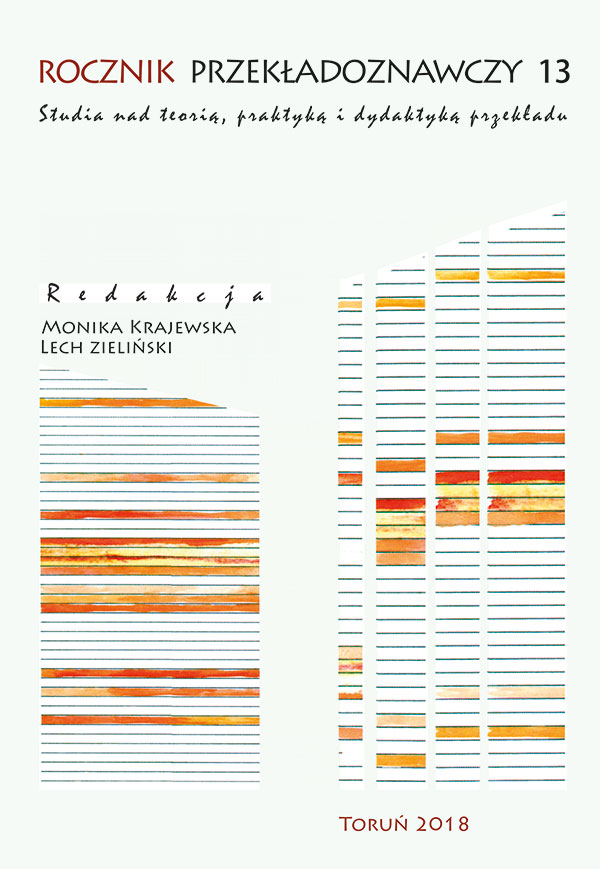Tłumaczenie amerykańskich sitcomów: piosenki jako wyzwanie dla tłumacza
DOI:
https://doi.org/10.12775/RP.2018.011Słowa kluczowe
tłumaczenie audiowizualne, sitcom, tłumaczenie humoru, piosenkiAbstrakt
Przedmiotem niniejszej analizy jest rola piosenek w amerykańskich sitcomach oraz możliwe problemy tłumaczeniowe związane z przekładem modyfikacji piosenek i nawiązań do znanychutworów muzycznych. Część teoretyczna poświęcona jest sitcomowi jako gatunkowi tekstu oraz ogólnym aspektom tłumaczenia piosenek. Następnie omówiono fragmenty zaczerpnięte z seriali „Friends”,„The Big Bang Theory”, „How I Met Your Mother” i z ich oficjalnych telewizyjnych tłumaczeń na język polski i niemiecki. Artykuł dowodzi, że w przypadku tłumaczenia sitcomów nieuniknione jest tłumaczenie piosenek oraz że w tym gatunku tłumaczenie piosenek stanowi równocześnie tłumaczenie humoru.
Bibliografia
Friends: The One with Ross’s Wedding (07.05.1998). Scenariusz oryginalny: M. Borkow, Sh. Goldberg-Meehan, S. Silveri. Wersja niemiecka: J. Richter. Wersja polska: M. Kwiatkowski.
Friends: The One Where Ross Moves in. (12.11.1998). Scenariusz oryginalny: G. McCreery, P. Rein. Wersja niemiecka: J.Richter. Wersja polska: I. Iwańska.
Friends: The One With Monica’s Boots. (06.12.2001). Scenariusz oryginalny: R. Carlock, B. Buckner, & S. Jones. Wersja niemiecka: J.Richter. Wersja polska: E. Stochwicz.
How I Met Your Mother: Sandcastles in the Sand. (21.04.2008). Scenariusz oryginalny: Kourtney Kang. Wersja niemiecka: Ch. Langhagen, N. Steinke. Wersja polska: J. Mikina.
How I Met Your Mother: Who Wants to Be a Godparent?. (15.10.2012). Scenariusz oryginalny: M. Kuhn. Wersja niemiecka: Ch. Langhagen, N. Steinke. Wersja polska: brak danych, na zlecenie: Comedy Central Polska Synthesis Media.
Grease. (brak danych). Wersja polska: A. Rostkowska.
The Big Bang Theory: The Vengeance Formulation. (23.11.2009). Scenariusz oryginalny: R. Rosenstock, J. Reynolds, & S. Holland. Wersja niemiecka: S. Ludwig. Wersja polska: R. Nosek.
Chiaro, D., 1992, The Language of Jokes: Analysing Verbal Play. London / New York.
Díaz Cintas, J. & Orero, P., 2010, „Voiceover and dubbing”, [w:] Handbook of translation studies. Volume 1, red. Y. Gambier, L. Van Doorslaer, Amsterdam / Philadelphia, s. 441–445.
Dore, M., 2008, The Audiovisual Translation of Humour: Dubbing the First Series of the TV Comedy Programme Friends into Italian, rozprawa doktorska, URL: https://www.academia.edu/16946977/MD_PHD_THESIS_The_Audiovisual_Translation_of_Humour_Dubbing_the_First_Series_of_the_TV_Comedy_Programme_Friends_into_Italian (dostęp: 7 października 2017 r.).
Döring, S., 2006, Kulturspezifika im Film: Probleme ihrer Translation (TRANSÜD. Arbeiten zur Theorie und Praxis des Übersetzens und Dolmetschens. Bd. 10). Berlin.
Kalaga, W., 1997, „Komizm a przekładalność”, [w:] Studia o przekładzie. Komizm a przekład, red. P. Fast, Katowice, s. 9–18.
Koller, W., 2004, Einführung in die Übersetzungswissenschaft. Wiesbaden.
Low, P., 2005, „The Pentathlon Approach to Translating Songs”, [w:] Song and Significance: Virtues and Vices of Vocal Translation, red. D. L. Gorlée, Amsterdam / New York, s. 185–212.
Mills, B., 2009, The Sitcom, Edinburgh.
Mintz, L. E., 1985, „Situation Comedy”, [w:] Television Genres: A Handbook and Reference Guide, red. B. G. Rose, Westport, s. 107–129.
Raphaelson-West, D. S., 1989, „On the Feasibility and Strategies of Translating Humor”, [w:] Meta. Volume 34, Number 1, s. 128–141, URL: http://www.erudit.org/revue/meta/1989/v34/n1/003913ar.pdf (dostęp: 23 kwietnia 2016 r.).
Savorelli, A., 2010, Beyond Sitcom: New Directions in American Television Comedy, Jefferson et al.
Smith, E. S., 1999, Writing Television Sitcoms, New York.
Spaeth, S., 1915, „Translating to Music”, [w:] The Musical Quarterly. Vol. 1, No. 2 (Apr., 1915), s. 291–298, Oxford, URL: http://www.jstor.org/stable/737851 (dostęp: 24 marca 2016 r.).
Tomaszkiewicz, T., 2004, Terminologia tłumaczenia, Poznań.
Tomaszkiewicz, T., 2006, Tłumaczenie audiowizualne, Warszawa.
Zabalbeascoa, P., 1994, „Factors in dubbing television comedy”, [w:] Perspectives: Studies in Translatology, 2(1), s. 89–99.
URL: http://bajlandia.tv/piosenki-dla-dzieci/pan-macdonald-farme-mial (dostęp: 31 marca 2016 r.).
URL: http://www.krasnale.de/index.php/home/piosenki-i-zabawy (dostęp: 31 marca 2016 r.).
URL: http://www.polskastacja.pl/tekst,piosenki,Teatr+Roma+-+Letnia+Noc (dostęp: 31 marca 2016 r.).
URL: https://sjp.pwn.pl/szukaj/humor.html (dostęp: 31 marca 2016 r.).
URL: https://sjp.pwn.pl/szukaj/zabawny.html (dostęp: 31 marca 2016 r.).
Pobrania
Opublikowane
Numer
Dział
Statystyki
Liczba wyświetleń i pobrań: 1860
Liczba cytowań: 0



